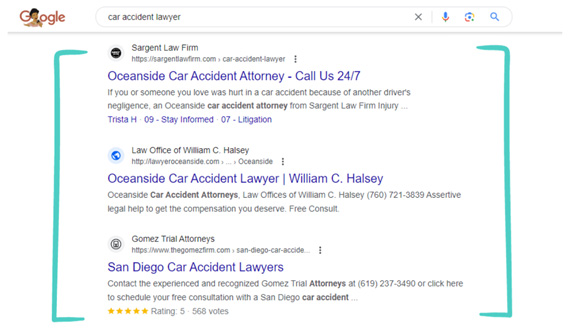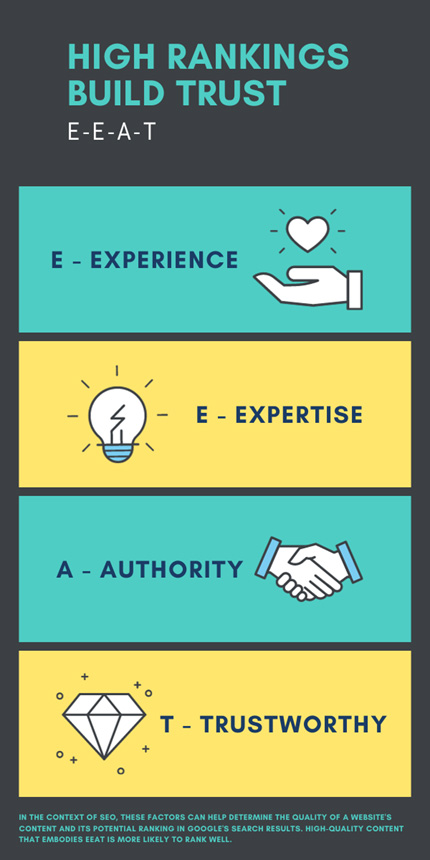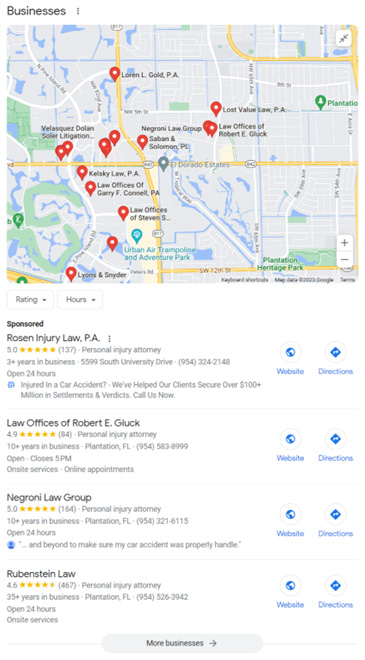Law Firm SEO: A Beginner’s Guide to SEO for Lawyers
Imagine putting your time, effort, and money into your online presence and then not seeing the results you’d expected. If you’re reading this now, chances are you don’t have to imagine this scenario, because you’ve already experienced it firsthand.
This is exactly what happened to one personal injury law firm in Florida. When they contacted our team at We Do Web, they had seven websites, and not one of them was ranking well in Fort Lauderdale, an important market that was critical to their success.
Their lack of results was the result of ineffective SEO. Once we had an effective SEO strategy in place and implemented it, we were able to significantly increase their traffic and the overall value of their firm — and you can do the same, if you know how.
Why You Need This SEO Guide for Law Firms
Any law firm can have a website, and in fact, most do. A 2021 survey found that 87% of the law firms that responded have websites. However, with so many legal websites online, it’s easy to get lost in the crowd and difficult to stand apart from your competitors.
Building a law firm website is not cheap. However, if your website isn’t built properly and lacks helpful content, chances are you won’t see a return on your investment.
That’s why we’ve created this beginner’s guide to SEO marketing for law firms. If you are a lawyer or an in-house SEO consultant at a firm and you aren’t satisfied with the return on your online marketing investment, the number of visitors you have each month, or the value of your organic traffic, this guide is for you.

Use This Lawyer SEO Guide to Dominate Your Market
Our beginner’s guide to SEO for lawyers will guide you through the basics of search engine optimization and how you can use it to grow your biggest online asset – your website. That’s exactly what we did for our South Florida client.
With our help, they grew from ranking for 500 keywords and getting 1,000 visits per month to ranking for 3,500 keywords and 35,000 visits per month. Today, their monthly organic Google traffic is worth $1 million.
Keep reading if you want to know how we did it and how you can also improve your SEO to maximize your online presence — and see tangible, lasting results.
This SEO guide will help you understand the basics of SEO for law firms.

What is law firm SEO?
Law firm website SEO (search engine optimization) refers to the strategies and techniques law firms use to improve their visibility and rankings in search engine results pages (SERPs) for relevant searches.
Pay-per-click marketing and local search ads will get you to the top of Google. However, it is only through SEO that you will get there organically, which builds credibility in a way no paid placement can. Your average searcher is going to click on the first few organic results because they know these are the pages Google considers to be most valuable.
The main goals of law firm SEO are to:
- Attract more prospective clients who are searching online for legal services. Good SEO can help drive more high-quality leads and signed cases.
- Build brand awareness and establish thought leadership. Ranking well for key terms can make your law firm appear more reputable.
- Outperform competitor firms. SEO is competitive, so firms want search domination for their practice areas.
When you’re building your law firm’s online presence, focus on meeting Google’s goal of providing the very best search results for the user’s query. Create helpful content. Build a fast, safe, and secure website. And make it user friendly. There’s a bit more to it than that – and you’ll find plenty of law firm SEO tips floating around – but those are the key parts.
By aligning your website and content with this goal in mind, you can rank highly for the search terms that are most commonly used by your prospective clients.

Why is SEO important for law firms?
“By building a website that performs in the organic search results, you are building an asset that’s yours.”
SEO is important to law firms because it plays a critical role in attracting clients. This is because a website’s click-through rate will be significantly higher in organic results when compared to pay-per-click (PPC) ads or even local service ads (LSAs). This is especially true if you are in the top three Google results.
One study found that 28.5% of Google users click the first organic result they see. The second position received 15.7% of clicks and the third position 11% of clicks. Web users trust search results, and you want to be among the ones they see. Average click-through rate for Google ads is about 4-6%, considerably lower than the top organic results.
If People Can’t Find You, They’ll Find Your Competitors Instead
Businesses everywhere want to dominate the web. But here’s one truth no company can ignore, including law firms: without SEO, you are invisible online. No one in the digital world will know who you are or how to find you, or what you have to offer. You won’t find the clients you’re looking for or the cases you want.

A solid SEO strategy has many parts, and all work together to ensure your website is accessible to search engines that will recognize it and make it easier for people to find you organically.
Whereas PPC and LSAs can be important parts of a legal digital marketing strategy – and they’re two pillars of legal digital marketing – they require replenishing a monthly ad spend budget. Once you turn off the budget, your ads go away.
SEO is different. By building a website that performs in the organic search results, you are building an asset that’s yours. You’re staking out your corner of the web, not just renting space in the ads or LSAs or on some other platform.
Done right, SEO provides a good return on your law firm’s investment by generating a steady stream of new leads. The leads it provides convert well, too.
High Rankings Build Trust
Most people now search online to find lawyers and legal services. Good SEO helps drive prospective clients to a firm’s website. When a law firm’s website has high rankings on the platform, it establishes credibility and trust. On Google, this is known as E-E-A-T, which stands for experience, expertise, authoritativeness, and trustworthiness. People often equate high rankings with being an authority on a topic.
Put simply: good SEO helps build a law firm’s reputation.
SEO Reinforces Your Other Marketing Efforts
SEO reinforces and integrates your law firm’s other marketing efforts by boosting the effectiveness of areas like content marketing, PPC ads, and social media. It can achieve this by building local and regional awareness of your brand.
Ranking for local markets and practice areas can establish your firm as an authority in the key markets you are targeting.
SEO Levels the Playing Field
If you are a smaller law firm that is competing against larger firms in your area, a strong SEO strategy can level the playing field. SEO allows smaller firms to compete for business against big firms with large marketing budgets because organic search is based on relevance, not just money spent.
If you want highly qualified prospects to find your law firm in a way that is cost-effective, SEO is key. By using SEO to optimize your law firm’s online presence, you can grow your client base and get the information the people who need your help are looking for on the front page, where they can connect with your firm.
What are the key elements of law firm SEO?
In order to develop a successful SEO strategy for your law firm, you will need to implement all of the key elements of SEO for law firms. But if you are an SEO beginner, you may be wondering how to start.
These are the key elements you will need for a successful SEO strategy:
Content
You must think about your website’s content first. It is the backbone and foundation of everything you will do for SEO. Content is everything on your website that your visitors will see. This includes practice area pages, FAQ (frequently asked questions) posts, blogs, articles, press releases, images, videos, graphics, and anything else you produce to promote your law firm.
Content is the reason search engines exist. Whether people search for content through text, voice, or AI (artificial intelligence), search engine algorithms will guide them to the best information and sources that answer their questions. Your content must be helpful, clearly reflect the user’s search intent (i.e., what they’re searching for), and be well-written and well-optimized.
“Content is the backbone and foundation of everything you will do for SEO.”
Well-optimized doesn’t mean keyword-stuffed. There’s no magic formula or combination of words and phrases that’ll make Google like your content better. Well-optimized means “optimizing” internal links to reflect a user-friendly page hierarchy. It means “optimizing” title tags, meta-descriptions, and keywords to align with the topics and search intent of prospective clients. And most of all, it means creating content that’s helpful to the user.
By doing that, your pages and website will rank for the keywords and key phrases that drive traffic that gets you more cases. Creating location-specific pages and content will allow you to target searches containing cities, counties, or states where you provide services. Identifying the terms and phrases your potential clients use to search for legal services in your practice areas and locations can also help you target your searches.
Tools like Google Ads Keyword Planner can help uncover data about the search terms your potential clients are using to find the services you offer.
SEO content tip: You can establish expertise and thought leadership in specific practice areas through content creation and promotion with E-E-A-T in mind.
A safe, secure website
Your website should ensure visitors are safe as they browse and interact with your site. A secure website that protects your users’ identities and personal information will help you build trust with your visitors and increase your credibility.
Search engines like Google will review your website’s security so they can know where to rank you in the search engine results pages. After all, Google wouldn’t be doing its job if its search results sent users to unsafe websites that jeopardize their personal data.
This is why you want your website to have HTTPS (SSL/TLS encryption). Enabling HTTPS encryption requires installing an SSL certificate on your web server to encrypt data transmission between your site and visitors. You will need to purchase and validate the SSL, then configure your server software to use HTTPS by default. This is a complex process, but your developer or web host can assist with SSL installation.
The investment is worth it. HTTPS has SEO ranking advantages because it protects user data and boosts trust through visual security indicators. Prioritizing SSL also shows that your law firm values client protection. The process takes effort, but it pays dividends in security, credibility and search performance.
If Google ranks your site higher because of this feature, it could raise your visibility online and get you in front of the people who need your legal services. Your site must also withstand attacks from hackers, malware, and other risks, and this feature will go a long way to help with that.
Website security tip: Enabling HTTPS and SSL encryption makes your site more secure and improves SEO rankings. Properly installing an SSL certificate shows search engines you value your site’s security and visitor protection.
Web design / UX
Strategic web development and SEO should go hand-in-hand in many ways. Law firm websites that are informative, engaging, easy to navigate, and user-friendly enhance the user experience, keeping visitors on their pages longer. Increased engagement alerts mean lower bounce rates, so search engines know users are getting quality content. This high level of engagement helps a site’s SEO.
Website design also affects page speed. If the loading time is minimal, users will have a better experience, which is a plus for SEO rankings. With these elements, you can create a website that leads to quality organic search results, high search engine rankings, and leads and sales for your law firm.
User experience matters. Search engines must crawl and index the content, which helps site visibility on the search engine results pages (SERPs). You will need a hierarchy that suits your site’s purpose and needs. If the algorithms understand your site’s structure, it could benefit your search rankings.
With most searches on mobile devices, sites need to be optimized for mobile user experiences. Leveraging speed optimization for faster load times has been proven to improve search visibility.
Website UX optimization tip: A/B testing and analytics tracking to optimize website UX and on-site elements can help you pinpoint what is working and what is not to maximize your contact and lead form completion rates.
Links
Some of what makes SEO effective happens behind the scenes. A solid off-page SEO strategy is also essential to a website’s success.
Building an optimally balanced, natural link profile takes time and effort. But just as citation building strengthens local SEO, high-quality external links signal industry relevance and authority to search engines.
Ethical link building can significantly multiply your law firm’s visibility. With a comprehensive on-page and off-page optimization plan, your website can become an invaluable asset for sustaining new business and growth.
Here are some of the ways you can get quality links to your law firm’s website:
- Citation building: Manual submission and monitoring of key legal directories, review platforms, and niche citation sources to strengthen local SEO authority.
- Reviews and testimonials: Ethical review generation tactics to build social proof and credibility on high-authority lawyer review sites.
- Content outreach: White hat outreach and content promotion to earn high-quality backlinks from legal trade resources, directories, and informational properties.
Link building is one area where you will want to spend some time. Gaining high-quality external links that link back to your page can improve your rankings and increase web traffic to your website.
Link building tip: It’s crucial to avoid black hat SEO in link building because it can lead to penalties from search engines, which can harm your online reputation and long-term SEO efforts.
What is local SEO for law firms?
Local SEO differs from traditional SEO because it focuses on increasing your rankings and visibility in your local search results. By using local SEO to optimize your website, you can attract clients from the specific geographic locations where your practice is located.

Some key elements of local SEO for lawyers that you should implement as part of your strategy include:
- Optimizing your firm’s website with geo-targeted content for each served location. This includes local phrases like “Atlanta divorce attorney.”
- Ensuring Google Business Profile and other local business listings are fully optimized with practice areas, correct contact information, descriptions, photos, etc. This helps local map rankings.
- Building localized citations and reviews on directories like Avvo, Lawyers.com, Martindale-Hubbell, Yelp, and more. This reinforces your law firm’s presence in each location.
- Creating location-specific landing pages and service pages optimized for that area’s keywords and search intent. For example “Philadelphia personal injury lawyers.”
- Targeting local link building outreach to get citations and links from websites focusing on each geographic market.
- Optimizing on-page elements including titles, headers, URLs, content, and schema for each location.
- Running pay-per-click (PPC) ads focused on geo-targeted keywords in AdWords to complement organic local SEO.
- Tracking rankings in Google Maps, local packs, knowledge panels, and organic results for targeted keywords in each location.
The goal is to signal authority and relevance to searchers looking for legal services in specific geographic areas the law firm serves. A strong localized SEO strategy is critical for competing and winning local prospects.
An important note about Google Business Profile (GBP): If you don’t already have this set up, it’s time to create this important business listing. This is the first step you’ll need to take if you want to rank on Google Maps and in local search results.
How important is monitoring and analysis in law firm SEO?
Monitoring and analyzing your law firm’s SEO efforts is everything. Is what you’re doing working? You need to know.
Measure traffic, rankings, and leads. But more than anything – SIGNED CASES. That’s why you’re doing this, and that’s what matters.
That’s why WDW measures your success – and ours – by how many signed cases you’re getting. Not just your traffic, rankings, and even leads. When it comes down to it, the only KPI that really matters is the number of people you are able to help through getting signed cases. And you can only know this through monitoring and analyzing your results.
Monitoring and analysis are very important in law firm SEO in order to:
- Track rankings and performance: It’s essential to monitor keyword rankings in Google search on an ongoing basis to see how efforts are impacting rankings over time. Tools like SEMrush, Moz, and Serpstat help track ranking progress.
- Identify SEO issues: Analysis can surface problems like technical errors, site indexing issues, spam link penalties, or sudden drops in rankings that need to be addressed.
- Inform optimization: Analytics insights into site traffic, conversions, and user behavior can reveal optimization opportunities to boost legal SEO performance.
- Benchmark against competitors: Competitor link profiles, rankings, and traffic levels can inform link building and content strategies.
- Prove ROI: Detailed tracking allows measurement of ROI from SEO by correlating rankings, traffic, and conversions to new leads/clients from organic search.
- Spot trends and opportunities: Emerging keyword trends, search intent shifts, and new optimization tactics can be identified through regular analysis.
- Reporting to management – Hard metrics prove the impact and value of SEO efforts to executives and stakeholders.
- Guide budget and resource allocation: Analytics help companies allocate SEO budget, staffing, and priorities across different practice areas and locations.
Without proper monitoring and analysis, law firms are essentially optimizing blindly. Effective analytics is required to maximize legal SEO success, prioritize the right focus areas, and demonstrate tangible results and ROI. It should be an ongoing process.

How to Implement the Key Elements of Law Firm SEO
Now that you know what the key elements of SEO for law firms are, you’ll need to implement them so they can start benefiting your law firm asap. When it comes to this, you’ll have a few options to choose from. Which one is right for you will depend on your needs, your resources, and your current situation.
To develop and implement an SEO strategy for your law firm, you can:
- Do it yourself: Only the brave (and those with a lot of free time) dare tread here. An effective law firm SEO strategy is a multifaceted plan of attack, and it can take a small army to win the war against your competitors. Don’t go it alone unless you have absolutely no other options.
- Hire in-house SEO help: You can hire an in-house SEO consultant to become a part of your team. This may be a good option if you want to work closely with an SEO pro, but only if you find the right person to align with your business who understands your goals and has the know-how to reach them.
- Partner with a law firm SEO agency: By working with a law firm SEO agency like We Do Web, you are partnering with a team of lawyer SEO experts who share a common goal with you: to get your firm to the top of the SERPs. When you go with an agency, you benefit from a collective wealth of information and expertise.
As Chinese philosopher Lao Tzu once famously said, “The journey of a thousand miles begins with one step.” SEO is a journey, and to get anywhere, you’ll need to take that first step and then remain steadfast with your efforts to build your law firm’s presence online.
Consider this guide your starting point in a journey that will be well worth the effort if you’re persistent, strategic, and committed.
Lawyer SEO for Beginners FAQs
Does SEO work for law firms?
If done correctly, SEO can put firms at the top of the organic search results which can help them grow and scale their business. In a competitive field like law, appearing at the top of the search results is essential. SEO works by increasing your law firm’s online visibility while connecting you with the people who need your services.
Do law firms need SEO?
If your competitors are using SEO to connect with prospective clients in your practice areas or locations, then your law firm needs SEO to stay ahead of the competition. SEO can make your firm easier to find and easier to review. Plus, your website can connect elements like social proof, testimonials, and case results to showcase them.
How can I get started with SEO for my law firm’s website?
To get started with SEO for your law firm’s website, do some keyword research to identify the search terms your prospective clients are using to find the services you offer. Then, write your site’s content, title tag, and meta description to align with these keywords and topics. Creating informative, high-quality content is the best thing you can do to improve your firm’s position in the search rankings.
What are some common SEO mistakes to avoid?
Some of the most common mistakes law firms make when they’re getting started with SEO include:
- Keyword stuffing (the excessive usage of keywords)
- Neglecting mobile optimization
- Ignoring local SEO (if you serve a specific geographic area)
- Not regularly updating your website’s content
- Using black hat SEO tactics (practices that area against a search engine’s guidelines)
How long does it take to see results from SEO efforts?
SEO is a long game, and trying to take shortcuts can hurt you in the long run. An effective SEO strategy can take months (or longer) before you see significant results. That’s why when it comes to SEO, patience is essential.
The exact timeframe it will take for your law firm to get results through SEO will depend on how competitive your niche and location are, the quality of your SEO efforts, and the authority of your website.
Should I hire an SEO professional for law firm SEO or do it myself?
You may choose to handle your SEO in-house, but many attorneys find that it is more cost-effective to work with a legal SEO agency that can save time while maximizing results. An agency will have a deep understanding of the latest SEO trends and best practices. Working with an agency can help you keep your focus on your practice and your clients.
How can I measure the success of my SEO efforts?
Key performance indicators (KPIs) for SEO success that you can use to measure your law firm’s SEO efforts include:
- Improved search engine rankings for targeted keywords
- Increased organic website traffic
- Higher click-through rates (CTR)
- Enhanced conversion rates
- Quality leads
- Signed cases
Monitoring these metrics using tools like Google Analytics is essential to track your law firm’s SEO progress.
